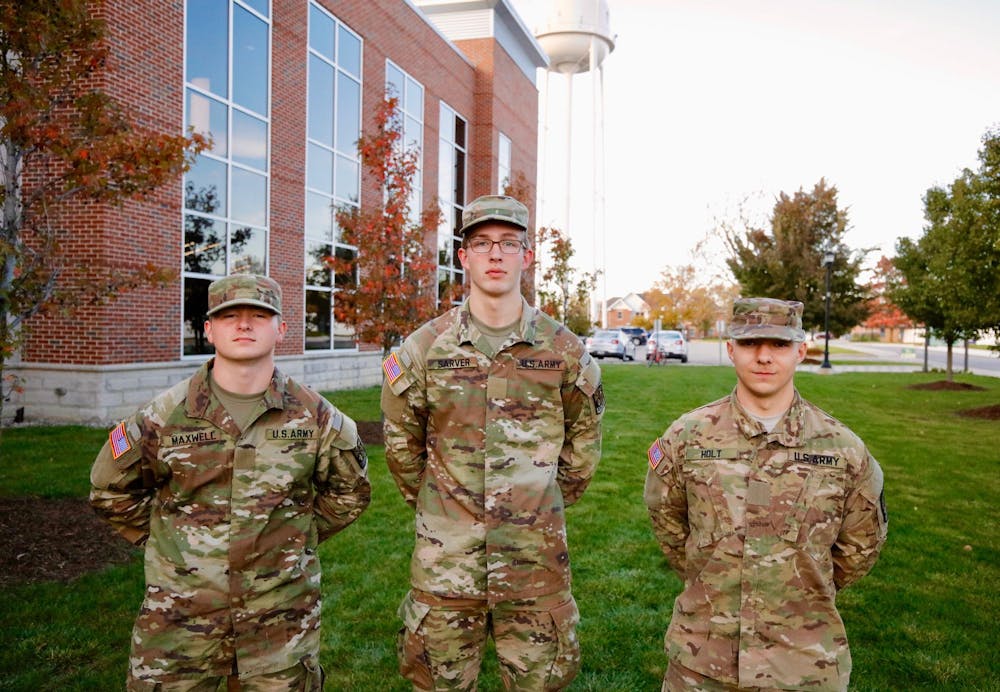When freshman Ezra Holt entered ROTC (Reserve Officer Training Corps) at Taylor University, he expected to find a strict and impersonal program. Instead, he found his expectations to be drastically incorrect.
Holt reflected on his past couple months at Taylor. He thought of the way the Christian environment affected the ROTC experience.
“We have a Christian lens, and we look at everyone as people and not just like beings that we expect something of,” Holt said.
Holt and some of the other freshmen found their superiors to be friendly and personable, unlike what he expected.
He has found pursuing a military education in a Christian environment to be rewarding.
"They have a want to make the program more still proficiency and performance-focused but also want to add Christ into that,” he said.
A typical ROTC program allows students to earn a bachelor’s degree while training to be an Army officer. Those who complete the program will graduate with a military science education and as a second lieutenant with a guaranteed career as an Army officer.
As a part of the military education, Holt is taking a course in military science and has a lab that accompanies it. Taylor University’s ROTC program partners with Indiana Wesleyan University (IWU) for weekly fitness exercises called PT, lab and class.
“After every lab, we get to give feedback basically to make it better, which is something new they're doing … so that's been really cool to be a part of and to see that example,” Holt said.
The biggest difficulty coming into the program for Holt was the discipline he had to exercise in order to manage his time and schedule.
On top of that, the daily PT in the morning requires an average wake-up time of 5 a.m.
“Monday is lift,” Holt said. “Tuesday is typically CrossFit. Wednesday is either a group workout at IWU or we have a run, and Thursday is almost always a run.”
The group will sometimes train in combat exercises, like kickboxing at the gym, or they could do a ruck with full bags.
All these activities have led Holt to consider how he lives in a way that he never had before.
“My mindset wasn't necessarily disciplined,” he said. “I was disciplined in my actions and my thoughts, but I didn't necessarily take that to heart and really live in that way … everything impacts everything … even just down (to) the diet … do I want to eat three pieces of cake and then, you know, run five miles the next day? Probably not.”
These difficulties in physical exertion, mental discipline and routine building in ROTC come with a further cost: a bond between the company members.
The camaraderie between the students allows them to bond in the face of extreme challenges. This is not just with the squad at Taylor, but also with the other students at IWU.
“I'd say at first we were definitely kind of weary of each other like we didn't know what to think … but the more time we spend there – the more time we spend together – we're definitely growing closer and just kind of embracing the fact that we're all going through extreme challenge right now,” Holt said.
Another aspect of Holt’s experience that cuts against the military stereotype is the way the women in the ROTC program bring a calming and personable element to the group.
Holt said their presence provides a counterbalance to the tendency to let everything be hard and serious, which people generally associate with the military.
“They kind of let us just relax a little bit … like it's not super serious all the time and we can be personable and have regular conversations that don't necessarily really touch whatever we're doing,” he said. “We can just talk to people as people.”
This personability also comes from the top down.
The sergeant and captain of Charlie Company, the collaborative group between Taylor and IWU, relates to the students with graciousness yet strictness.
Taylor’s squad leader, Garrett Vandermark, was a freshman last year and the only ROTC student on campus. Now, he is the squad leader for the other eight freshmen this year.
Holt also appreciates his firm leadership.
While it seems that ROTC could detract from the ways a student can get involved on campus, Holt found this not to be the case.
“I still find time to eat dinner with my wing every night, hang out with my wing every day and connect with friends through different activities on campus … so you can definitely be super involved,” he said.
Holt’s participation in ROTC also provides him with additional opportunities to serve off campus. A recent example of this is when he volunteered at Marion High School to run a ranger challenge as a part of their junior ROTC program.
The volunteering also comes with an additional perk of a day off from PT.
Ultimately, the ROTC program at Taylor continues in the university’s mission to create servant leaders.





